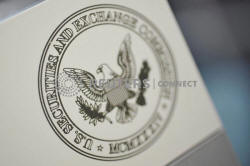|
The
SEC had given U.S. brokers until the middle of next year to
comply with MiFID II, due to a quirk in the U.S. federal
securities law that bars U.S. firms from complying with the EU
rules, which took effect in January 2018.
The European rules aim to eliminate conflicts of interest by
giving investors greater transparency over how much they pay
banks for discrete services but have caused a slew of
cross-border compliance issues for U.S. firms.
"MiFID II has been quite a big issue. We did give temporary
relief and I think what we're going to end up doing is probably
extending that relief because we're trying to come up with a
permanent solution, but it's not that easy," Peirce told members
of the American Chamber of Commerce in Japan.
She added that a solution that might work for some firms might
not actually work well for other firms.
"Maybe the Europeans could change their approach, that's a
possibility. We do a lot of communication with our foreign
regulatory counterparts."
(Additional reporting by Hideyuki Sano; Editing by Jacqueline
Wong)
[© 2019 Thomson Reuters. All rights
reserved.] Copyright 2019 Reuters. All rights reserved. This material may not be published,
broadcast, rewritten or redistributed.
Thompson Reuters is solely responsible for this content.

|





